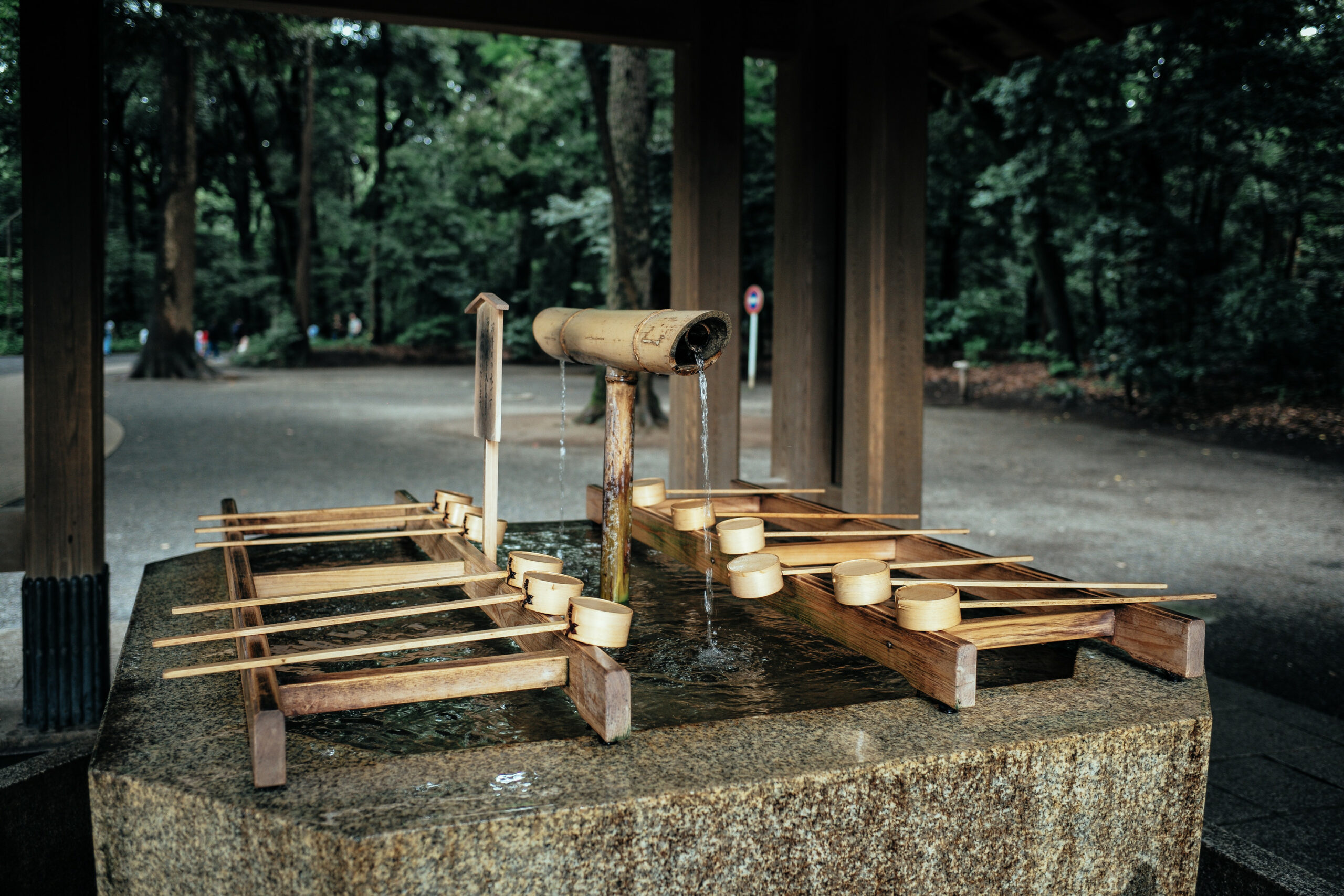He said to her, “Daughter, your faith has healed you. Go in peace and be freed from your suffering.” Mark 5:34
If you come to Japan and visit a Shinto shrine, you will notice near the entrance a wooden roof covering a stone basin filled with water. Water is flowing into the basin from the mouth of a dragon statue or bamboo pipe and some ladles are neatly placed on the edge of the basin. This is a “temizuya” – a place for ritual purification before entering a shrine. Visitors wash their hands and rinse out their mouths to purify themselves from impurities before approaching and praying to the Shinto gods..
Ritual purification is probably not something that many of us think much about today, but for the Jews in Jesus’ day it was a familiar and very relevant concept. The Mosaic Law in the Old Testament listed many conditions or acts which made someone unclean, together with the different purification offerings which an unclean person needed to make to become clean again.
In Mark Chapter 5 we meet a woman who is unclean because she is subject to bleeding. According to Leviticus 15:25-27 someone in her position was unclean for as long as she was bleeding, which for this woman was 12 years. Her condition is not only physically debilitating, but also socially isolating. People avoid her, because anyone who comes into contact with her becomes ceremonially unclean themself and has to complete the necessary purification ritual to be clean again. But this woman does not have that option. As long as she is bleeding there is nothing she can do to become clean again and so she is ostracised from her family, community and the temple.
She has persevered, trying everything to get well again. She has used up all her money going to different doctors but rather than get better, her condition has worsened. I am sure she prayed regularly too. It is hard to imagine what her life was like day in and day out for those 12 years, desperate to be made clean again, but finding no answers.
And then one day she hears about Jesus, probably about his healing miracles. Suddenly she has hope. But she is unclean. She can’t just approach Jesus and ask him to heal her, and anyway he is always surrounded by a crowd. But she is desperate and so makes her way through all the people, probably crouching down to avoid being spotted. “If I just touch his clothes, I will be healed,” she thinks. She comes up behind Jesus and touches the edge of his cloak.
Then something amazing happens. After all those years of illness and persevering, her bleeding stops and she is instantly healed. Instead of Jesus becoming unclean when she touches him, she has been made clean by touching his cloak. She wants to remain anonymous but Jesus has other ideas. Sensing that power has gone out of him he asks, “Who touched my clothes?” The disciples think he’s crazy to ask this in the middle of a jostling crowd, but Jesus perseveres. “Who touched me?”
The woman now realises she can’t go unnoticed and comes forward trembling, falling at Jesus’ feet, telling him her whole story. And then Jesus says something amazing, “Daughter, your faith has healed you. Go in peace and be freed from your suffering.” Her faith has healed her, her simple faith based on hearing some stories about Jesus.
She came to Jesus sick and left healed. Instead of making Jesus unclean she was made clean. She pushed through the crowd unnoticed, but left publicly affirmed. She started that day ostracised from her family and community and ended it being called “daughter” by the Son of God. Her world was literally turned around.
I think that this story challenges us in several different ways. Firstly, there is the challenge of perseverance. This woman persevered for 12 years seeking healing. Surely there were days when she felt like giving up, but she didn’t. God had something planned for her which was far better than just physical healing, but she had to wait for it.
Secondly, the challenge of this woman’s determination to reach Jesus, even though she was physically weak, despite the crowd, and even though she was unclean and risked people’s displeasure if seen. She didn’t let anything stand in her way.
We are also challenged by her faith. She didn’t fully understand who Jesus was. She didn’t have all the answers. Her faith was simple, even mixed with superstition, but it was real. What was important was who her faith was in – in Jesus.
This woman came to Jesus because she had heard about him. In those days that presumably meant that she heard other people talking about him, about what he had done. And so we are challenged – are we talking about Jesus, believing that some who hear will then seek him out for themselves?
And finally there is the challenge to remember how Jesus values each individual person. He persevered in finding out who had touched him because he wanted to speak with that person, to restore and affirm them as “daughter”, a child of God.
We do not need to do purification rituals to be made clean. Our faith is not based on what we do, but on what Jesus has done for us. Jesus took our uncleanness and made us clean, acceptable in God’s sight, and to be sons and daughters of the king. And that is worth talking about.
By Lorna Ferguson



